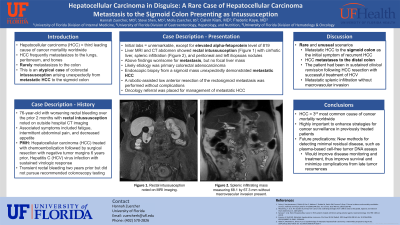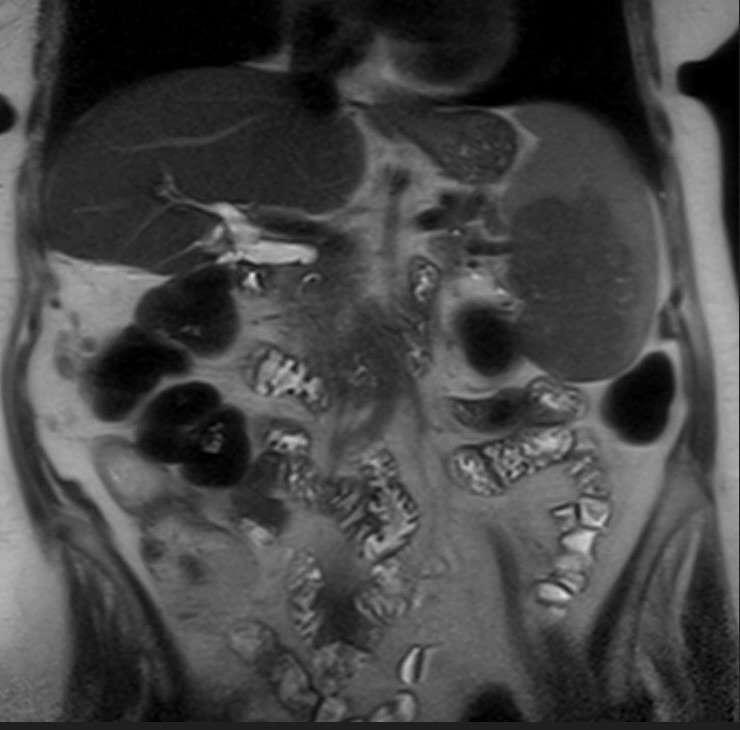Sunday Poster Session
Category: Liver
P1327 - Hepatocellular Carcinoma in Disguise: A Rare Case of Hepatocellular Carcinoma Metastasis to the Sigmoid Colon Presenting as Intussusception
Sunday, October 27, 2024
3:30 PM - 7:00 PM ET
Location: Exhibit Hall E

Has Audio

Hannah L. Zuercher, MD
University of Florida College of Medicine
Gainesville, FL
Presenting Author(s)
Hannah L. Zuercher, MD1, Steve Shen, MD1, Molly Zuercher, BS2, Calvin Kiani, MD1, Frederic Kaye, MD1
1University of Florida College of Medicine, Gainesville, FL; 2University of Nebraska College of Medicine, Gainesville, FL
Introduction: Hepatocellular carcinoma (HCC) is a leading cause of mortality worldwide. While HCC frequently metastasizes to the lungs, peritoneum, and bones, it is rare for HCC to metastasize to the colon. Thus, we present an atypical case of colorectal intussusception arising unexpectedly from metastatic HCC to the sigmoid colon.
Case Description/Methods: A 76-year-old female was transferred to our hospital for worsening rectal bleeding over the prior 2 months with rectal intussusception noted on CT imaging. Associated symptoms included fatigue, intermittent abdominal pain, and decreased appetite. Her past medical history was significant for hepatocellular carcinoma (HCC) treated with chemoembolization followed by surgical resection with negative tumor margins 6 years prior. She was treated for hepatitis C (HCV) and achieved sustained virologic response. Notably, the patient experienced transient rectal bleeding two years prior and was advised to receive a diagnostic colonoscopy, but did not pursue testing. On presentation, vital signs were stable. Initial labs were unremarkable, except for elevated alpha-fetoprotein level of 819. Liver MRI and CT abdomen showed rectal intussusception with cirrhotic liver, splenic infiltration, and peritoneal and left iliopsoas nodules worrisome for metastasis, but no focal liver mass. These findings were consistent with a primary colorectal adenocarcinoma, however, endoscopic biopsy from a sigmoid mass unexpectedly demonstrated metastatic HCC. A robotic-assisted low anterior resection of the rectosigmoid metastasis was performed without complications; an oncology referral was placed for management of metastatic HCC.
Discussion: Here we present a case of metastatic HCC to the sigmoid colon as the initial symptom of recurrent HCC. This diagnosis was unexpected since metastases to the distal colon are infrequently documented, and the patient was otherwise in sustained clinical remission following HCC resection with successful treatment of HCV. It is also uncommon for metastatic splenic infiltration without macrovascular invasion to be present. HCC is the third most common cause of cancer mortality worldwide, emphasizing the importance for enhancing strategies for cancer surveillance in previously treated patients. It is anticipated that new methods for detecting minimal residual disease, such as plasma-based cell-free tumor DNA assays, will allow improved disease monitoring and treatment to improve survival and minimize complications from late tumor recurrences.

Disclosures:
Hannah L. Zuercher, MD1, Steve Shen, MD1, Molly Zuercher, BS2, Calvin Kiani, MD1, Frederic Kaye, MD1. P1327 - Hepatocellular Carcinoma in Disguise: A Rare Case of Hepatocellular Carcinoma Metastasis to the Sigmoid Colon Presenting as Intussusception, ACG 2024 Annual Scientific Meeting Abstracts. Philadelphia, PA: American College of Gastroenterology.
1University of Florida College of Medicine, Gainesville, FL; 2University of Nebraska College of Medicine, Gainesville, FL
Introduction: Hepatocellular carcinoma (HCC) is a leading cause of mortality worldwide. While HCC frequently metastasizes to the lungs, peritoneum, and bones, it is rare for HCC to metastasize to the colon. Thus, we present an atypical case of colorectal intussusception arising unexpectedly from metastatic HCC to the sigmoid colon.
Case Description/Methods: A 76-year-old female was transferred to our hospital for worsening rectal bleeding over the prior 2 months with rectal intussusception noted on CT imaging. Associated symptoms included fatigue, intermittent abdominal pain, and decreased appetite. Her past medical history was significant for hepatocellular carcinoma (HCC) treated with chemoembolization followed by surgical resection with negative tumor margins 6 years prior. She was treated for hepatitis C (HCV) and achieved sustained virologic response. Notably, the patient experienced transient rectal bleeding two years prior and was advised to receive a diagnostic colonoscopy, but did not pursue testing. On presentation, vital signs were stable. Initial labs were unremarkable, except for elevated alpha-fetoprotein level of 819. Liver MRI and CT abdomen showed rectal intussusception with cirrhotic liver, splenic infiltration, and peritoneal and left iliopsoas nodules worrisome for metastasis, but no focal liver mass. These findings were consistent with a primary colorectal adenocarcinoma, however, endoscopic biopsy from a sigmoid mass unexpectedly demonstrated metastatic HCC. A robotic-assisted low anterior resection of the rectosigmoid metastasis was performed without complications; an oncology referral was placed for management of metastatic HCC.
Discussion: Here we present a case of metastatic HCC to the sigmoid colon as the initial symptom of recurrent HCC. This diagnosis was unexpected since metastases to the distal colon are infrequently documented, and the patient was otherwise in sustained clinical remission following HCC resection with successful treatment of HCV. It is also uncommon for metastatic splenic infiltration without macrovascular invasion to be present. HCC is the third most common cause of cancer mortality worldwide, emphasizing the importance for enhancing strategies for cancer surveillance in previously treated patients. It is anticipated that new methods for detecting minimal residual disease, such as plasma-based cell-free tumor DNA assays, will allow improved disease monitoring and treatment to improve survival and minimize complications from late tumor recurrences.

Figure: Splenic infiltrating mass measuring 68.1 by 67.3 mm without macrovascular invasion present.
Disclosures:
Hannah Zuercher indicated no relevant financial relationships.
Steve Shen indicated no relevant financial relationships.
Molly Zuercher indicated no relevant financial relationships.
Calvin Kiani indicated no relevant financial relationships.
Frederic Kaye indicated no relevant financial relationships.
Hannah L. Zuercher, MD1, Steve Shen, MD1, Molly Zuercher, BS2, Calvin Kiani, MD1, Frederic Kaye, MD1. P1327 - Hepatocellular Carcinoma in Disguise: A Rare Case of Hepatocellular Carcinoma Metastasis to the Sigmoid Colon Presenting as Intussusception, ACG 2024 Annual Scientific Meeting Abstracts. Philadelphia, PA: American College of Gastroenterology.
